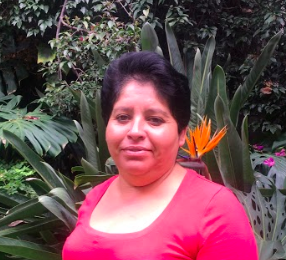February 11, 2019
Justice Along the Way: Lucía Oliva Trejo

Originally from La Loma in Chapulhuacán, Hidalgo, Lucía Oliva Trejo arrive in Louisiana to work in the seafood industry with an H-2B visa.
"When I went, there were many job opportunities for men but few for women." Lucía faced labor abuses in part due to the lack of information -- about the recruitment process, the job offer and her rights as a migrant worker.
When Lucía and her colleagues -- mostly women -- arrived at their workplace, her supervisor took their passports. Her employer arbitrarily deducted workers’ salaries and did not give them enough work.
Many became ill and others suffered accidents. When a colleague had an accident in her workplace, Lucía remembers how instead of covering her expenses, her employer returned her colleague to Mexico. Their coworkers organized to pay for her transportation costs home.
When Lucía met Centro de los Derechos del Migrante (CDM), a civil society organization dedicated to defending the rights of migrant workers, she thought: if I had met them when I went to work, things would have been different
Then she joined the CDM’s Migrant Defense Committee, where she is dedicated to preventing recruitment fraud and talking about labor rights in her community. She heard of recruiters who have become rich by charging more than 7,000 pesos in illegal fees in exchange for U.S. jobs.
Lucía believes that disseminating information along workers’ journeys -- from recruitment to the workplace -- is crucial to avoid abuse.
Her work as a community leader never ends. When her sister went to work in the United States recently, Lucía told her: "The fact that you are hired does not mean that you are going to be a slave, you must fight for your rights!" Before her sister left, Lucía handed her a packet of cards with CDM’s contact number. "Give them to your friends because they are going to work in other states," she said. "You never know when they may come in handy."
-------
This is the fourth article in the series Justice Along the Way, where worker leaders speak about their experiences in the US and their impact on their communities.
